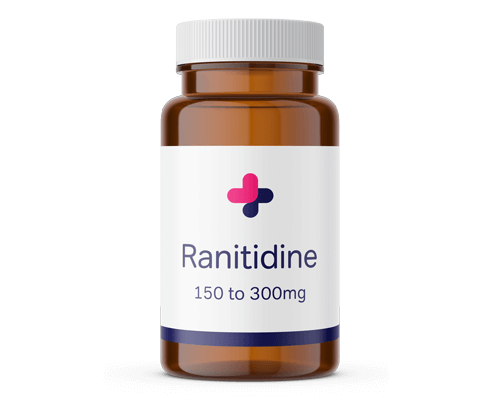Precautions
Improvement in symptoms with Ranitidine does not exclude the possibility of having stomach cancer, and you should see a doctor periodically to monitor symptoms. Since Ranitidine is removed by the kidney, the dose needs to be reduced in patients with kidney disease. Avoid Ranitidine if you have a history of acute porphyria. Rare cases of reversible confusion have been reported in elderly patients. Vitamin B12 deficiency has been reported in prolonged treatment (>2 years).
Side Effects
Stop taking these tablets and tell your doctor immediately if you experience an allergic reaction such as swelling of the tongue/throat/face, difficulty breathing, rash, difficulty swallowing.
Notify your doctor if you have frequent chest pain; frequent wheezing particularly with heartburn; nausea/vomiting; unexplained weight loss; stomach pain; heartburn longer than 3 months; heartburn with light-headedness, sweating, or dizziness; chest pain or shoulder pain with shortness of breath; sweating or pain that spreads to arms, neck, or shoulders; light-headedness. Stop use and notify your health care provider if heartburn continues, worsens, or lasts longer than 14 days.
Some possible common side effects include:
- Malaise
- Insomnia
- Dizziness
- Depression
- Confusion
- Abnormal heart rhythms
- Diarrhea
- Constipation
|
- Nausea/Vomiting
- Abdominal pain or discomfort
- Elevated liver enzymes
- Blood count changes
- Feeling tired, or weak
- Joint pain
- Rash
|
Drug Interactions
The co-administration of Ranitidine with other medicines may interact with the effects of Ranitidine, or these other medicines. This is the list of medications that are known to interact with Ranitidine. Always inform your doctor of all the drugs and supplements you take.
- Procainamide
- Warfarin
- Atazanavir
- Delavirdine
- Gefitinb
- Glipizide
- Ketoconazole
- Midazolam
- Traizolam
- Chemotherapy and immunologic therapy
Contraindications
It is contraindicated to take Ranitidine in the following cases:
If you are allergic to ranitidine hydrochloride or any other ingredients in Ranitidine (see ingredients)
If you have trouble or pain when swallowing food, vomiting with blood, or bloody or black stools, allergic reaction to Ranitidine or other acid reducers.
Do not use with other acid reducers. Do not use 150 mg tablets with kidney disease without medical advice.
Is Ranitidine safe in pregnancy?
Ranitidine does cross the placenta. However, if needed, Ranitidine is the agent of choice for GERD during pregnancy. Ask your doctor before use if pregnant or planning to become pregnant.
Is Ranitidine safe during breastfeeding?
Ranitidine is excreted into breast milk. The manufacturer recommends caution be used if taking Ranitidine while breastfeeding. It is best to ask your doctor if this medication is safe and necessary during breastfeeding.

















Quick and discreet
I ordered Azithromycin tablets for chlamydia treatment, received it next day in a brown discreet pack, and cheaper than all other pharmacies, can't ask for more
Jordan McCann